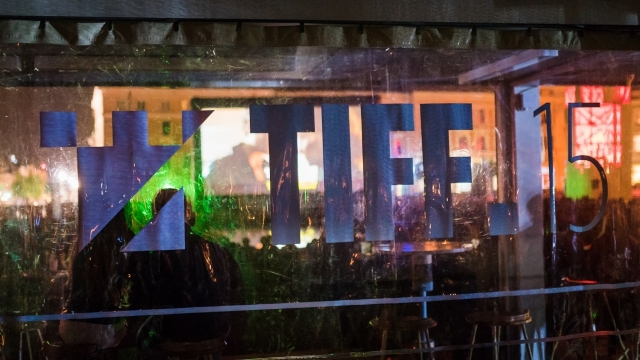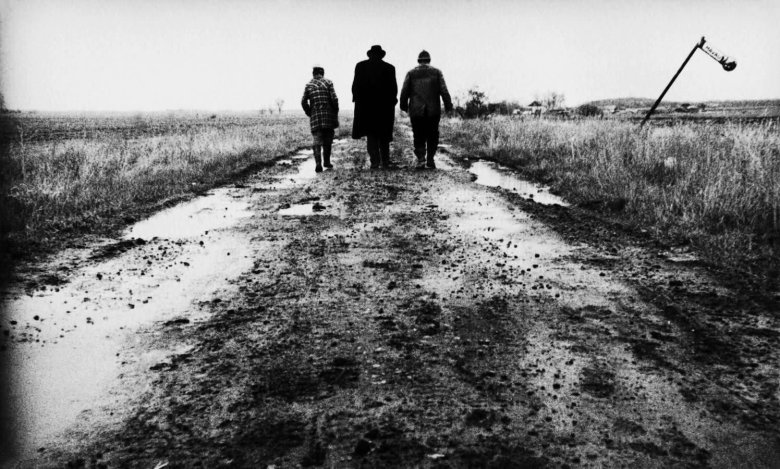Of course TIFF is a chance for Romanians to see not only the best of the country’s own output but also a vast range of films from round the world, with this year special strands dedicated to films from Lebanon, Lithuania and Croatia, as well as animal themes, horror and several directors’ retrospectives. Their cheap ticketing policy, the screenings outside the city centre, the social spaces in and around the cinemas, the Q&As following many screenings, mean this particular audience – lots and lots of students but ordinary townsfolk too – is very well-informed and perceptive. They might laugh more than I did at a popular comedy like Eastern Business, but they are also attentive and full of questions at hard-hitting documentaries and demanding features from all over the world. And how good it is at this festival to be able to watch the films as a member of real audience rather than in the sometimes artificial and loaded atmosphere of a press screening.
The sobering Hungarian documentary CAIN’s CHILDREN (KAIN GYERMEKEI) appears in the Educatiff strand, which is usually aimed at young people. But this is a very grown up theme indeed. Thirty years ago several young teenagers who had committed murder were featured in interviews in a documentary, FAILED. Now Marcell Gerő has traced three of them and followed their days a little, unobtrusively coaxing them, and their relatives, to talk about their lives and eventually about their crimes. The new material is intercut with the murky black and white footage of them as youths, mostly looking more embarrassed by what they had done than ashamed, and strangely alike. Their fresh-faced younger selves give often wavering, sometimes altering versions of their crimes, with occasional glimpses of the nightmarishly chaotic young offenders’ institution they are in. It’s hard to make out the unexceptional teenagers as the worn middle-aged men, so much are their experiences carved into their faces.
All the killings were explosive, spontaneous, though it emerges that much was already seething away beneath. Pali, who killed his violent father, seems to have had a lifetime of being told he’s no good. Now he longs for a proper relationship with his own children, as if to heal the past. Joszef killed an abusive teacher, and has become a mild, drunken vagrant with a professorial look who lives on what he can get for bottles he collects from bins. And yet he has a warm and affectionate relationship with his ex-partner, also an alcoholic, by whom he has a child. If only… they both say, even while knowing a normal family life could never have happened for them. Most complex and disturbing is Zsoll, who killed a friend he found with his mother, the village prostitute. He is intelligent, well-read and politically aware, and crystal clear about his crime, and the only one with decent accommodation – but you soon realise it is a bed in an institution. And that he’s murdered again. The dark mystery of a life destroyed by one almost casual yet inescapable deed, growing out of backgrounds of abuse and horrific poverty, is what they have in common, and it’s hard too not to be shocked by their current deprived and squalid surroundings in today’s ‘modern’ Europe. There’s little redemption here. This is a very impressive debut.
From Austria comes the contemplative documentary BROTHERS OF THE NIGHT (BRUDER DER NACHT) by Patric Chiha, a visually fine portrait of a group of young Bulgarian Roma men who inhabit Vienna’s underworld, making what living they can, mostly by hustling in gay bars. The director has won impressive honesty from the boys as they talk about their lives and their hopes, and it’s a sometimes surprising view of an existence spent, despite its dark side, in a kind of lighthearted camaraderie. More of the same in similar vein does become a little monotonous after a while, though, and a shorter version might have been more powerful.
Canada has produced some very exciting directors in these last few years, but I don’t think Guy Edoin will be joining my list of must-watches. Admired by some, his VILLE-MARIE stars Monica Bellucci, glowing and emoting as an actress performing in a film made by her ex-partner and mirroring her own life. It’s a strong performance by Bellucci, who’s beginning to have the mournful and damaged look of the mature Jeanne Moreau, night-time Montreal looks ravishing, and the film begins impressively with a young man casually walking to a bus stop where something momentous and shocking happens. But sadly the whole thing soon becomes almost as contrived and formulaic as the film we observe being shot, which is a dreary and melodramatic tale of the travails of a wealthy wife with a stereotype brutish husband. It’s particularly irritating, or did I miss something cleverly ironic here, that the action of the film within the film is presented to us in its final glossy edited form, close-ups and different camera angles and all, only to draw back and reveal it being shot from a single camera on set. A preposterous, semi-pornographic, abortion scene is especially crass, particularly when seen here in the country of 4 Months 3 Weeks 2 Days, and its mawkish role in the plot leaves a nasty taste. Add an artily shot gay threesome, a guy with PTSD, crashing ambulances, and possibly the most unflattering bra ever to be seen onscreen and – enough already! The interweaving with tales of the hospital staff who are tangentially involved feels forced, and the only successfully achieved character is that of the emergency room nurse. Comparisons with All About My Mother are not flattering.
LOST IN MUNICH (ZTRACENI V MNICHOVE) by Petr Zelenka (Czech Republic) is an odd one. During the Munich peace conference in 1938, at which Daladier, the French premier, Chamberlain, Hitler and Mussolini discussed the question of Hitler’s claims on parts of Czechoslovakia, Daladier’s very attentive and articulate pet parrot, we are told, was present. Now at the age of 90, he’s a guest of the Czech French Cultural Institute, and begins to repeat things he heard there, most controversially insults made by Deladier during the negotiations. But just when I began to feel the comic possibilities of this scenario were running out, it turned into a very different film. If I’d had doubts about the authenticity of the parrot story, I was now invited to have doubts about everything I was seeing. A large poster of Truffaut’s La Nuit Americaine which makes more than one appearance is a nudge in the direction of the way this film is going, as it sets us up with various layers of possible realities and intentions, even taking us wrily into the murky waters of international film funding. It’s a touch too long, but a brave and sparky conundrum on what to believe and what not to believe when we watch a film, or indeed judge a political figure. Concentrate!
One of the last events of the festival was a treat. FROM THE SEA TO THE LAND BEYOND is a powerful, emotional, spectacular and enlightening compilation from over a hundred years of BFI archive by film-maker and alternative theatre director Penny Woolcock, about all aspects of the UK as a maritime community. Work – shipbuilding, fishing, including one of my favourite pieces of British archive, the independent Scottish herring girls who followed the fishing fleet down the East Coast; leisure, from the Sunday-best-clad crowds flocking down the promenade to sandcastle-building kids to 50s holiday camp jollities; the drama and beauty of the sea – destructive storms, wartime damage, lifeboat rescues, come together in a loosely chronological way to make a stunning montage. It’s full of moments of powerful meaning, such as when knockabout beach frolics morph into military training with bayonets. The band who wrote and performed its pumping, atmospheric soundtrack, British Sea Power, were here to perform it live in the majestic acoustics of the Student Hall.
The uproarious reception that the mainly Romanian audience, innocent of childhood memories of very British seaside holidays, battles against a wild and unpredictable ocean, or even the poignancy of those smiling pre-World War One crowds laughing and larking about, was striking. And it underlined once more the enormous value, emotional, informative and aesthetic that a film festival can bring to its location, perhaps even more importantly than to its well-travelled and experienced guests and critics.
A post script on the Romanian shorts, always a must-see because of the chance to test the water of upcoming talent. Sadly I only got to 11 of the 18 this year.
Winner was A NIGHT IN TOKORIKI (O NOAPTE I TOKORIKI) by Roxana Stroe, the exhilarating tale of a trip to a village party by a group of country boys, told with such zip and zing that you hardly notice there is no real dialogue, only music, dizzying movement and a whirling camera to carry the story along. The opening sequence of the cartful of lads driven by Alin, his face full of expectation -of what? – is a joy to behold. Special mention went to MY NAME IS COSTIN (MA CHEAMA COSTIN) by Radu Potcoava, a beautifully acted, creepy little film based on true events, which offers a profound mystery without answers. Notable others included NINEL, a story of a town girl who travels to meet her internet date knowing nothing about him but his occupation. It’s a journey from smart city centre of bars and plate glass to scruffy suburban bus stops and down-at-heel flats, sophistication meeting a distinctly un-smart, unreconstituted maleness. WALL presents a pair of young people waiting in a hospital, a beautifully framed depiction of the oddity of what important decisions on life are made by people we don’t know in these sterile places, slyly enlivened by the banal routines of the security man in his cabin. In SECOND LOOK (TE MAI UITI SI LA OM) by Ana-Maria Comanescu a rather iritatingly lovey-dovey couple find their relationship becoming unravelled when they pick up a hitchhiker. And elliptical story-teller Andrei Creţulescu has, in contrast to his last year’s uncompromisingly harsh and shocking winner, produced a warm and intriguing domestic tale, SEVEN MONTHS LATER (SAPTE LUNI MAI TARZU), bearing his trademark witty and subtle dialogue and precise camerawork.
June 2016






